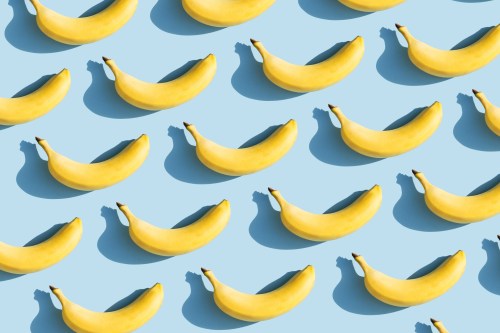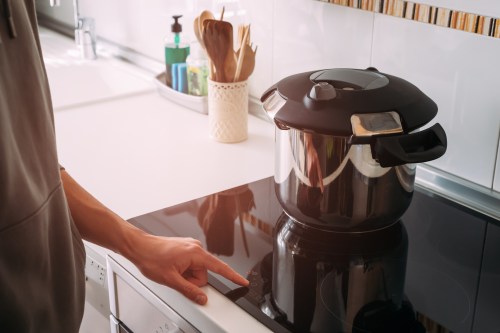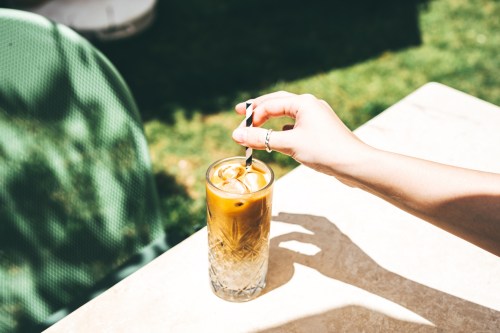Ahh, good old H2O—the elixir of life. I remember watching the show Survivorman religiously when I was younger, in which a cameraman and survivalist expert Les Stroud set up cameras all over the world and survived in forests, desserts, tundras, islands, and even a raft floating at sea. The first thing that he would always do, no matter what, was look for water. The famous quote that he managed to get into almost every episode was that you could survive for a handful of days (even weeks) without food, but the human body can’t survive without water for very long at all—think three days, max.
Experts in This Article
registered dietitian nutritionist and co-founder of FWDfuel
Michael Swartzon, MD, is a primary care sports medicine physician with Baptist Health Orthopedic Care.
So, sure, you’re probably not in a survival situation, but there are a *lot* of ways the body can become dehydrated. Exhibit A: Typing non-stop for hours and subsisting on only cold brew. What this is a pretty predictable way to dehydrate yourself (and yet I continue to do it on my worst days), what about the not-so-obvious causes of dehydration? Needless to say, these sneaky scenarios are smart to have on your radar.
Predictable and unpredictable causes of dehydration to be mindful of
First things first. “Dehydration can be caused by several key factors, particularly exercise or training intensity, environmental conditions, and how much fluid you have consumed,” says Michael Swartzon, MD, primary care sports medicine physician with Baptist Health Orthopedic Care.
Dr. Swartzon says that as soon as someone loses two percent of body mass from fluid losses or more, their performance levels can quickly diminish and dehydration levels will intensify. Unfortunately, most people don’t really have a mechanism for assessing how much body mass you’ve lost via sweat. A good rule of thumb, says Dr. Swartzon, is to remember that whenever anything is leaving your body, you’re also losing water. “And I mean anything,” he adds.
Seeing as dehydration can occur outside of the more obvious I’ve-been-playing-soccer-for-hours-in-100-degree-weather scenarios and that it can be challenging to spot—and easy to ignore—some of the symptoms of it, what are some of the lesser-known causes of dehydration to keep an eye on this season? As we forage full steam ahead (no pun intended) into August, Dr. Swartzon has answers.
1. Being in a new environment
“Some of the people that are at a higher risk for heat-related illnesses, including dehydration, are those who have not spent much time outdoors and are in a new environment,” says Dr. Swartzon. For example, when folks who live in the Northeast travel to warmer climates like South Florida. “If they are visiting friends or family who are used to being on a boat all the time, and they’re not, it’s important to watch out for them. Make sure they’re wearing a hat, they’re drinking water, and wearing their sunscreen,” he says.
This is also true for those changing up their daily habits, like ramping up social activities on a weekend, trying a new workout class, or doing something all day in the sun that is out of your typical routine. Getting caught off guard without water access in the heat—such as at an amusement park, protest, concert, or hike—is also a great opportunity for dehydration to hit you like a ton of bricks.
2. Day drinking
Sure, if you’ve ever had a hangover, then you know that alcohol can leave you wickedly dehydrated. However, one sneaky cause of dehydration is drinking during the day. Think about it: An evening at dinner or a bar tends to last anywhere from three to five times shorter than when people plan a day drinking event. These contexts are typically also out in the elements like a hot beach, busy attraction, or somewhere that might require a strenuous commute.
3. Drinking enough fluid with imbalanced electrolytes
“Keep in mind that if you’re dehydrated and drinking water seemingly to no end, you might still need more electrolytes,” says Kylene Bogden, RDN, registered dietician at BareOrganics and co-founder of FWDfuel. “Someone who is extremely active, especially in the heat, and only drinking water can still get dehydrated. When you sweat, you also also lose electrolytes, like sodium, potassium, and magnesium. This is why sports drinks are popular and useful; if you’re not a fan of the flavors or sugar quantities of common brands, packing a tube of tablets like Nuun is also an option.”
4. Consuming caffeinated beverages
You’ve likely heard that caffeine is a dehydrating beverage. This is because it is a diuretic, meaning that it makes you pee more. “This means that you should be replacing the fluids that you lose from the caffeine factor—ideally, you should have two glasses of water for every caffeinated beverage you’re consuming to make up for what the caffeine causes you to lose,” says Dr. Swartzon.
5. Going number two
“Again, anything leaving your body—pee, sweat, vomit, diarrhea, and even your breath—can cause you to lose water,” says Bogden. This is why you can still get dehydrated overnight as you sleep (especially if you tend to inhale and exhale through your mouth). These are all very normal aspects of bodily functioning, which is why drinking water and recouping your electrolytes is a daily need.
But on that note, know that pooping can also cause you to lose water. This is especially true when you have diarrhea, which can be extra dehydrating. Any time you’re feeling less than regular, it’s smart to get some extra water in.
6. Spending a lot of time breathing heavily
Yes, really. Think about in the winter when you can see your breath—this happens because the water vapor in your breath cools to the point that it starts to become a liquid. That liquid in question is, of course, mostly water. “This vapor is always escaping your body; you can just see it when you’re out in the cold,” says Bogden. “This is another reason why physical activities that cause your heart to pump like running, weight lifting, and sports are major causes of dehydration.”
7. Forgetting to hydrate because it’s *not* hot outside
Many folks—whether exercising or not—are prone to forgetting to sufficiently hydrate when it’s cold outside. Remember: You don’t need to be doing cardio in the sweltering heat to fill up that water bottle! “It makes sense to think that you’re not expending fluids in the cold, but you definitely are and you should definitely still be hydrating,” says Bogden. “Physical activity and just existing can be dehydrating in any weather, not just hot temperatures.”
8. Consistently undereating
“Food can absolutely hydrate us—hello soups, smoothies, and oatmeal—and an inadequate intake of calories over weeks and even days in some situations can absolutely lead to dehydration,” says Bogden. “It’s definitely important to eat as much as your body needs, because that helps you have a regular awareness of your hunger and thirst cues. Sometimes when you are under-eating and drinking, your body’s cues for hunger, thirst, and dehydration can be hard to discern or present as unpleasant symptoms like stomach ache, gastrointestinal trouble, confusion, irritability, or the like.”
TL;DR? Listen to what your body is telling you—and when in doubt, hydrate and eat a hearty snack.
How can you counteract these causes of dehydration
“For starters, be sure to consume electrolytes in addition to water, especially if you are active or are a heavy sweater,” says Bogden. Electrolytes are critical for muscle, brain, and heart function. Severe electrolyte imbalance, if unaddressed, can be a life or death situation. “Also, make sure to eat regular balanced meals each day. If you’re someone who doesn’t love the taste of water, add a squeeze of lemon or lime to your water for flavoring.”
Dr. Swartzon also stresses that dehydration can get dangerous for your health very quickly, so it’s important to practice healthy habits around staying out in the heat, eating enough, drinking the daily recommended water for your body size, and listening to your body early on. Planning ahead and hydrating days before a bigger event or commitment outside is also important in preventing dehydration, as well.
Sign Up for Our Daily Newsletter
Get all the latest in wellness, trends, food, fitness, beauty, and more delivered right to your inbox.
Got it, you've been added to our email list.











